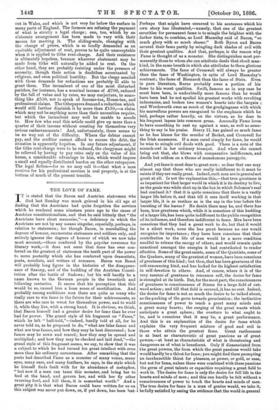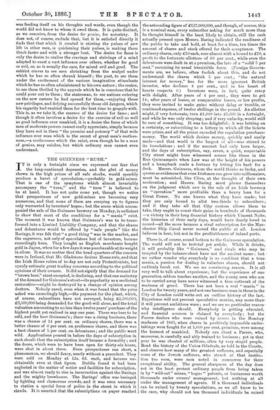THE LOVE OF FAME.
IT is stated that the Saxon and Austrian statesman who died last Sunday was much grieved in his oil age at finding that the Austrians had quite forgotten the services which he rendered some nineteen years ago to the cause of Austrian constitutionalism, and that he said bitterly that "the Austrians have short memories,"—a deficiency in which the Austrians are not by any means singular, especially, perhaps, in relation to statesmen; for though Bacon, in marshalling the degrees of honour, enumerates statesmen and soldiers only, and entirely ignores the degrees of honour of which we now take most account, —those conferred by the popular reverence for literary work,—it does not seem that fame has ever con- ferred on the greatest of statesmen the tenth part of the power to move posterity which she has conferred upon dramatists, poets, novelists, and writers of romance. Baron von Beast will probably long figure in the histories of the disappear. ance of Saxony, and of the building of the Austrian Consti- tution after the battle of Sadowa ; but his will hardly be a name known to the German people in the twentieth and following centuries. It seems that his perception that this would be so, caused him a keen sense of mortification. And probably among ambitions men there are quite as many who really care to win fame in the future for their achievements, as there are who care to wrest for themselves power, and to wield it, while they live, with a strong hand. It is obvious, we think, that Bacon himself had a greater desire for fame than he ever had for power. The grand style of his fragment on "Fame," which he left " half-told,"—indeed, hardly told at all, for he never told us, as he proposed to do, "what are false fames and what are true fames, and how they may be best discovered ; how fames may be sown and reared ; how they may be spread and multiplied ; and how they may be checked and laid dead,"—the grand style of this fragment.seems, we say, to show that it was a subject to which he had turned his great intellect with even more than his ordinary earnestness. After remarking that the poets had described Fame as a monster of many voices, many eyes, many ears, and many feathers, he says, in the style which he himself finds fault with for its abundance of metaphor, "but now if a man can tame this monster, and bring her to feed at the hand, and govern her, and with her fly other ravening fowl, and kill them, it is somewhat worth." And a great pity it is that what Bacon could have written for us on this subject was never put down, or, if put down, has been lost- Perhaps that might have occurred to his acuteness which his own story has illustrated,—namely, that one of the greatest securities for permanent fame is to mingle the brighter with the darker tints, to combine, as Lord Macaulay said of Bacon, "so much glory with so much shame." Both Byron and Bacon secured their fame partly by mingling dark shades of evil with their greatest qualities. And that, perhaps, is the reason why Fame is thought of as a monster. She distinguishes most per- manently those to whom she can attribute deeds that shock man- kind, in the same breath in which she attributes to them glorious achievements. The fame of Cromwell will always be greater
than the fame of Washington, in spite of Lord Macaulay's contrast; the fame of Bismarck than the fame of Stein. Even in pure literature, Burns probably owes a portion of his fame to his worst qualities. Swift, famous as in any case he must have been, is undoubtedly more famous than he would. have been had he not spoiled his greatest works with revolting indecencies, and broken two women's hearts into the bargain ; and Wordsworth owes as much of the griulgingness with which his marvellous powers are recognised to the emphasis which he laid, perhaps rather heavily, on the virtues, as he does to his frequent lapses into common prose. Assuredly Fame loves to have something to cast up against a man, as well as some- thing to say in his praise. Henry II. has gained as much fame as he has blame for the murder of Becket, and Cromwell for the Irish massacres. If a man eared simply for fame, he would be wise to mingle evil deeds with good. There is a note of the screech-owl in her ordinary trumpet. And when she cannot bring out that, she blows with comparative indifference, and dwells but seldom on a theme of monotonous panegyric.
And yet fame is most dear to great men ; so dear that one may almost say that those who are really indifferent to it must be saints if they are really great. Indeed, such men are in general not great at all. Is not the explanation this,—that true greatness is as impatient for that larger world in whieh it is its destiny to live, as the genie was while shut up in the box in which Solomon's seal had confined it P that it is quite conscious that there is a vastly larger life before it, and that till it sees itself working in that larger life, it is as restless as is the sap in the tree before the bursting of the leaves P No doubt there may be, and there has been, true greatness which, while it is conscious of this budding of a larger life,has been quite indifferent to the public recognition of its influence, and therefore indifferent to fame. Men have been conscious that they had a great work to do, but that it would be a silent work, none the less great because no one would recognise its importance ; they have been conscious that their contribution to the life of men would be a mere condition needful to release the energy of others, and would remain quite unnoticed amongst the energies it had contributed to render effective. Some of the great saints, some of the Quietists, some of the Quakers, many of the greatest of women, have been conscious of greatness of this kind ; but then, that has been greatness of the self-renouncing kind, and has looked for its highest satisfaction in self-devotion to others. And, of course, where it is of the very essence of greatness to renounce self, the desire for fame is strangled at its birth. But, for the most part, the consciousness of greatness is consciousness of fitness for a large field of out- ward action ; and till that field is secured, it has no rest. Indeed, the desire for fame is not so much the desire to be talked about, as the pushing of the germ towards germination ; the instinctive consciousness of power to reach a great many minds and a great many hearts; the surging of the great wants which anticipate a great sphere ; the overture to what ought to be, and is conscious that it may be, a great performance. And this is an explanation of the desire for fame which explains the very frequent mixture of good and evil in those who attain the greatest fame. Great restlessness is at least as characteristic of great passions as of great powers,—at least as characteristic of what is threatening and. dangerous as of what is beneficent. Only if disassociated from the great powers, the form which the great passions would take would hardly be a thirst for fame; you might find them prompting an inexhaustible thirst for pleasure, or power, or gold, or ease, but not for fame, unless there were combined with these passions the germ of great talents or capacities requiring a great field to work in. The desire for fame is only the desire for full life in the hearts and minds of men ; and this can hardly be felt without a consciousness of power to touch the hearts and minds of men. The true desire for fame in a man of genius would, we take it, be fully satisfied by seeing the evidence that the world in general was feeding itself on his thoughts and words, even though the world did not know to whom it owed them. It is quite distinct, as we conceive, from the desire for praise, for notoriety. It does not, of course, exclude that, but it is satisfied directly it finds that that which it created is stirring the pulses of new life in other men, is quickening their pulses, is making them throb faster and with a stronger beat. The desire for fame is only the desire to realise the cravings and strivings of a mind adapted to exert a vast influence over others, whether for good or evil, or, as is usually the case, for mixed evil and good. The satirist craves to see men shrinking from the scalpel under which he has so often shrunk himself ; the poet, to see them under the excitement of the various imaginative stimulants which he has so often administered to his own nature ; the orator, to see them thrilled by the appeals which he is conscious that he could pour out to them ; the statesman, to see nations entering on the new careers he had opened for them,—enjoying those new privileges, and defying successfully those old dangers, which his sagacity had enabled them for the first time to grapple with. This is, as we take it, the essence of the desire for fame ; and though it often involves a desire for the exercise of evil as well as good influence over mankind, it is a desire the force of which men of moderate powers cannot really appreciate, simply because they have not in them "the promise and potency " of that wide influence over man which is the secret of great men's restless- ness,—a restlessness which the saint, even though he be a man of genius, may subdue, but which ordinary men cannot even understand.





































 Previous page
Previous page